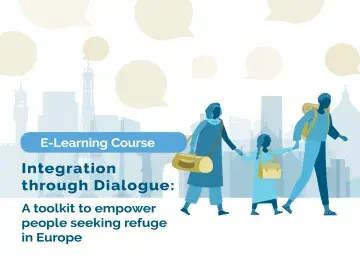Integration through Dialogue: A toolkit to empower people seeking refuge in Europe
KAICIID’s Europe Region Programme supports people seeking refuge to improve their process of integration in their new host society. In this context, a toolkit was developed for newcomers in Europe to strengthen dialogue as a two-way process of mutual learning that takes place at all levels of society.
Based on this toolkit, this self-paced e-learning course sees dialogue as a practical tool for integration that government authorities and NGOs, including faith-based actors, can use in their daily work as an addition to existing programmes and frameworks they have established. The main objective of this e-learning course is to facilitate dialogue with people seeking refuge in Europe to better integrate them in host societies.
The target audiences of this self-paced e-learning course are public authorities and civil society organizations, including faith-based organizations, working in Europe on the social inclusion and integration of people seeking refuge. It will be of particular relevance to trainers, facilitators or mentors who are actively in touch with people seeking refuge, as the course will enhance their approach and methodologies.
The e-learning course is also a valuable tool for anyone who is interested in engaging with people seeking refuge and providing a dialogical lens. It is important to note that while this e-learning course will provide you with deeper insights on facilitating dialogue sessions, the assumption is that previous facilitation experience already exists to successfully – and responsibly – run dialogue cycles with people seeking refuge.
The e-learning course “Integration through Dialogue: A toolkit to empower people seeking refuge in Europe” is comprised of four modules. It is a self-paced course so the learner can adjust to their own speed and time availability. To ensure commitment and finish the course, it is recommended to be done over a four-week period:
Week 1, Module 1: The Importance of Dialogue
Week 2, Module 2: The Toolkit
Week 3, Module 3: The Dialogue Session
Week 4, Module 4: The Dialogue Cycle
*Each module should take about 1.5-2 hours to complete
By the end of this four-module course you will:
- Understand why dialogue with people seeking refuge is important and how it can contribute to their integration into society.
- Know how to use the themes, activities and additional materials of the toolkit in practice, in order to create and facilitate a dialogue session or dialogue cycles.
- Know what you need to do before, during and after a dialogue session.
- Understand how to implement and evaluate a dialogue cycle.
- Lear the value and application of interreligious and intercultural dialogue in a variety of contexts.
In order to ensure the best possible outreach, the course is delivered through an interactive online platform, which allows users to take the course at their own pace. Course objectives are intended to be achieved through a variety of educational methods and technologies, designed to match personal learning styles, as well as by the inclusion of non-linear learning that aims to develop just-in-time learning skills for adults. At the same time, in order to allow participants maximum flexibility when it comes to scheduling, the learning is conducted in an asynchronous manner and combines self-learning with tests, assessments and online discussions. The pedagogy has been adapted for full-time career professionals and is specifically tailored to train participants through a variety of learning methods: absorb (read); do (activity); interact (socialize); and reflect (relate to one’s own reality).
Modern and updated browsers.
A Certificate of Completion will be issued to participants who achieve a minimum total score of 70%.
KAICIID's E-Learning Programme includes digital knowledge tools, e-learning courses and thematic webinars, which teach dialogue as a tool to solve global issues. All e-learning courses are linked with global initiatives and development goals for sustainable peace. The courses build the capacities of global leaders to address a number of today's most pressing challenges by using interreligious dialogue to establish ethical policymaking frameworks, support peace processes, and address discrimination and religiophobia, at national and local levels. KAICIID e-learning courses are interactive, offered free of charge and are designed to benefit both dialogue professionals and the general public.
E-Learning in IRD designed for the general public


